
timmyo
-
Posts
183 -
Joined
-
Last visited
Content Type
Profiles
Forums
Events
Shop
Articles
Posts posted by timmyo
-
-
more pics added in initial post bump
-
[quote name='Alien' post='294481' date='Sep 29 2008, 12:55 PM']What qualifies as a 'posh' Wah then? I've got a Morley PWV if that's any good?
Andy[/quote]
Hi Andy - I'm after a Teese/Fulltone/Budda - that sort of thing. I've never really got on with the Morleys myself,
Regards,
Tim -
-
-
Just a small transaction but he got my cables to me in the 1st class post next day - much appreciated, thanks,
Tim -
[quote name='The Funk' post='287550' date='Sep 19 2008, 06:25 PM']For out and out practice amps, I like the little Warwick combos.[/quote]
Not seen one of those.
It's a bit of a problem round here - no really big shop to try lots of stuff. For example those 2 were the only Line6 and Roland amps they had. another shop in town has a couple of Hartke amps and a Fender or 2, and that's the lot really for smaller stuff.
I'll check out the Warwicks online - ta -
OK I found a shop locally that has the Line6 Lowdown 110 Studio and the Roland Bass Cube 30 - both very nice - wouldn't have a problem owning either, although I doubt I'd use the FX on the Roland. The shop was a bit pricey mind (£220 for the Line6, £200 for the Roland) so I'll buy elsewhere or s/h - but because I felt a tidge guilty for using them as a demo service I bought some strings lol
Tim -
-
[quote name='Balcro' post='286012' date='Sep 17 2008, 04:11 PM']Hi Tim,
I've been through this same process with jamming & rehearsals in mind. As you're migrating from a guitar, technically you're probably way ahead of me, but I looked at it this way: - what I need is a headphone socket for near silent home practice, an aux-in/CD input socket for playing along to tracks/mp3's. If the amp didn't have those simple facilities then I crossed it off the list.[/quote]
This is probably a sensible approach for me, tempting though the occasional "better" s/h item might look.
A few others have caught my eye from nosing around :
Roland Bass Cube 30
Line6 Lowdown Studio 110
Looks like the N8 is discontinued so hard to actually find. The N10, new, costs about double what I said above.
@ andyonbass : did I buy a Yamaha bass from you about a year ago ? If so I'm afraid I promptly sold it as I joined a band and got busy on guitar
-
Hmm. Yeah something I class as 'big' now may well not be a properly viable long-termer anyway I suppose.
I'm a little wary of tiny practice things though - the Stagg 20w one I tried was just naff - varying degrees of "FLOMP FLOMP FLOMP" - although that's probably the curse of the tiny cheap bass amp! -
You know how it is, there's what you [b]need [/b]and what you start looking at 'cos it's shiny . . .

All I really [b]need [/b]is a practice amp - something that'll make a noise and which is a bit more engaging to use than headphones from the PC amp sim.
Where my head keeps taking me is to look at stuff that'd stand up in a small rehearsal as I would like to play with others as soon as my ability allows (I'm an adult migrating from/supplementing guitar).
So I go round in circles from teeny tiny things that are easy to pay for and own, through to the occasional apparent secondhand bargain that's more powerful.
So help me organise my thoughts by 'talking' aloud and getting your responses:
I could grab a Peavey Microbass - have heard good things about them
I have seen an Eden N8 for £70 - have read good things about them
I have seen an Eden Nemesis N15S for £200 (getting bigger - unecessary ?)
Oddly there are 3 Fender rumbles (2 60s and a 100) for sale locally ranging from £60-£100
Occasionally see bigger/louder/better stuff at 200-300+ : possibly walk before run going on here
I've got analysis paralysis and the each evening end up on the headphones again and kick myself for not just sorting it out
ta for any pointers,
Tim -
-
If I can't fix the treble pot on mine I don't suppose there's any reason this wouldn't drop in to my Fender P Lyte ? How is it likely to compare quality-wise with the factory controls ? Also (sorry for all the Qs) are the freqs a preamp operates at more fo a personal preference thing, or might one brand actually sound poor with the wrong bass that it wasn't designed for ?
ta
Tim
Tim -
The relatively inexpensive (£160) Fender P Lyte I just bought has a non-working treble control (it's active P/J with vol, blend, bass, treble controls). I've looked inside the cavity and there's nothing obviously disconnected and a (very) gentle wiggle of connections doesn't result in anything.
I'm just wondering if it's really worth paying someone to look at it, or if a comparable replacement might be as cost effective - obviously not top of the range stuff, but anything more modest ?
Suggestions / ideas welcome,
ta
Tim -
[quote name='cheddatom' post='284822' date='Sep 16 2008, 10:40 AM']Heh, I find it interesting too!
I deffinitely do hear differences on my board, being that there are 20 odd crap buffered pedals on there.
So you are best to have one decent buffer at the start of your chain, and one at the end then?[/quote]
I've never needed one at the end - but if it sounds better . . .
In your shoes I'd spend some time trying to identify where the problem pedal was (it's probably just one or 2 of the buggers) , and either see if there are commonly known mods that improve it, or just switch it for an alternative. I've got a neat little dual true bypass loop, so I put half n one loop, half in the other and switched them in and out (all pedals 'off') to quickly narrow down where I had any issues. Although I only did this after I'd thinned the collection down and discovered that none of what I was left with had issues
-
[quote name='cheddatom' post='284792' date='Sep 16 2008, 09:54 AM']So it's the fact that the first pedal in your chain will interact with passive pups, and putting a pedal with an output buffer first in the chain means it won't interact?
I think I need to do some reading up before I can understand this.[/quote]
That first pedal will still potentially interact with the pickups (as the buffering doesn't occur until its own output stage) but if it's a decent pedal (and bear in mind all this is only relevant for 'naughty' pedals) then that won't be a problem. I used to have LOTS of pedals and for sake of ease I left them all set up all the time. I once removed my Korg DT-10 tuner from the front of the queue to the end and noticed a significant difference. I didn't faff about trying to identify the problem pedal(s) - I just stuck the DT-10 back at the front and all was well again.
The absolutely theoretical best way to do this is use a dedicated line driver/unity gain buffer first in the chain. I actually got a mate to make me a little 1" square PCB laid out for a unity gain circuit. I even have the components and box ready to solder it up. I've just been to idle to do it That way you can worry less about your old pedals and less than top of the range patch cables as you have a nice buffered, low output-Z signal to play with.
That way you can worry less about your old pedals and less than top of the range patch cables as you have a nice buffered, low output-Z signal to play with.
But again, for many people it's never an issue - the pedals they have behave fine and/or any effect is so minimal as to not be noticed. I recently seriously cut mack my guitar effects board and did an experiment the other day switching stuff in and out of a true bypass loop - I couldn't hear any difference any more, so all is now well.
I don't doubt that you hear issues on your board - but it may well be not due to buffering/impedance mismatching - there may be something else at work.
Apologies if any of this sounds preachy - I just find it interesting
-
Passive pickups have a high output impedance (hence instrument inputs on mixers and desks are usually labelled "Hi-Z" or similar).
Some effects pedals are not very well designed and their effective input impedance can be sufficiently low as to cause the circuit to load the pickups enough to affect the frequency response we get out of the pickups (usually heard as a top end rolloff - sometimes imperceptible, sometimes not - depends on the combination of pedal and instrument). It's not just a case of whacking the signal up at some point in the line - it's about impedance matching so as not to load the pickups.
So sh**ty bypass isn't usually something that has some rubbish component in the signal path introducing noise or anything like that, it's more often a poorly (or at least not quite well enough) designed output buffer circuit, or a cheaply implemented output buffer circuit (often the culprit - if they save 1p on components in a million pedals...). (Most mass produced pedals use output buffer circuits - it means that the rest of the circuit doesn't have to worry about unity gain - it gets sorted at the output. Most boutique builders don't use output buffers as it's more components and less profitable and harder to do in short runs/hand building, so they use simpler circuits and then wax lyrical about the "benefits" of true bypass becasue it's their only realistic choice )
)
Years ago I could have gone in to more detail - but it's a while since that part of my brain got used
-
[quote name='mcgraham' post='284067' date='Sep 15 2008, 09:17 AM']I'd like to point out that this is [b][i]not[/i][/b] the floating thumb technique. That is, for lack of a better definition, a movable anchor, and presents a great difficulty of shifting up and down strings over true floating thumb or total anchor. Floating thumb means [i]NO[/i] anchoring, i.e. the side of your thumb slides across the strings and doesn't actually anchor to any of them. Search for Gary Willis or Todd Johnson on Youtube for a better illustration.[/quote]
I checked out some Youtube vids by the people you mentioned and also found links to tohers. I've just been having a go at the true floating thumb and for the most part I find it easier (particularly when playing the ADG strings) - just feel a little 'lost' when paying the E. Moving across the strings feels more straightforward without feeling for where to anchor the thumb. I'll use this method for a while and see how I go.
As for the other matter I think I may well take the plunge and get the Friedland book and see how I get on with the dots. -
'm having a gigging gear re-organisation and putting this one up for sale. It has had 70s Celestion G12H speakers fitted and is currently fitted with NOS Mullards and Brimars (well obviously they're not "N" any more but not had too much use!) and has basketweave rather than plain black grille cloth.
Serviced (valve base replaced) and biased by UK amp guru Simon Law c. 6 months ago and full Marshall factory clean bill of health about a year before that (when I bought it)
I'm based on the M4 corridor in England - happy to meet up to to a deal to make sure this awesome thing gets where it is going safely. Otherwise it can be couriered (insured only) at cost.
£500
Some pics:

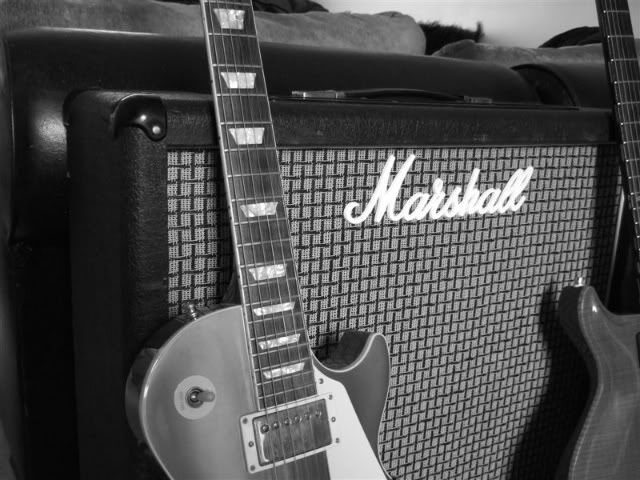
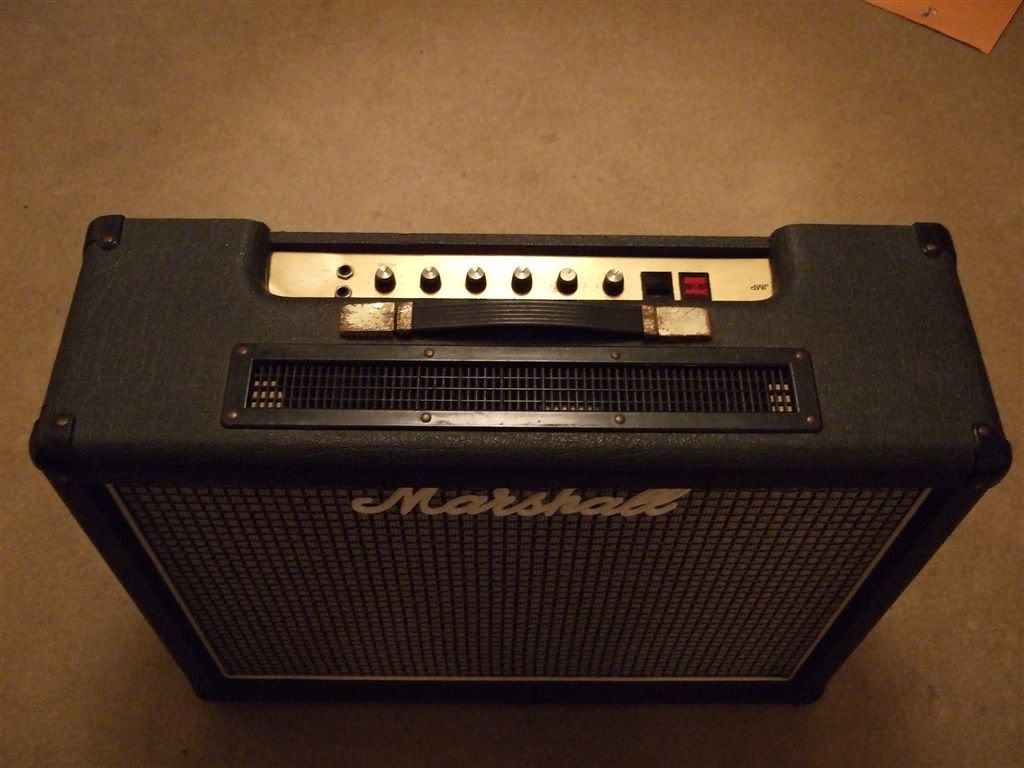
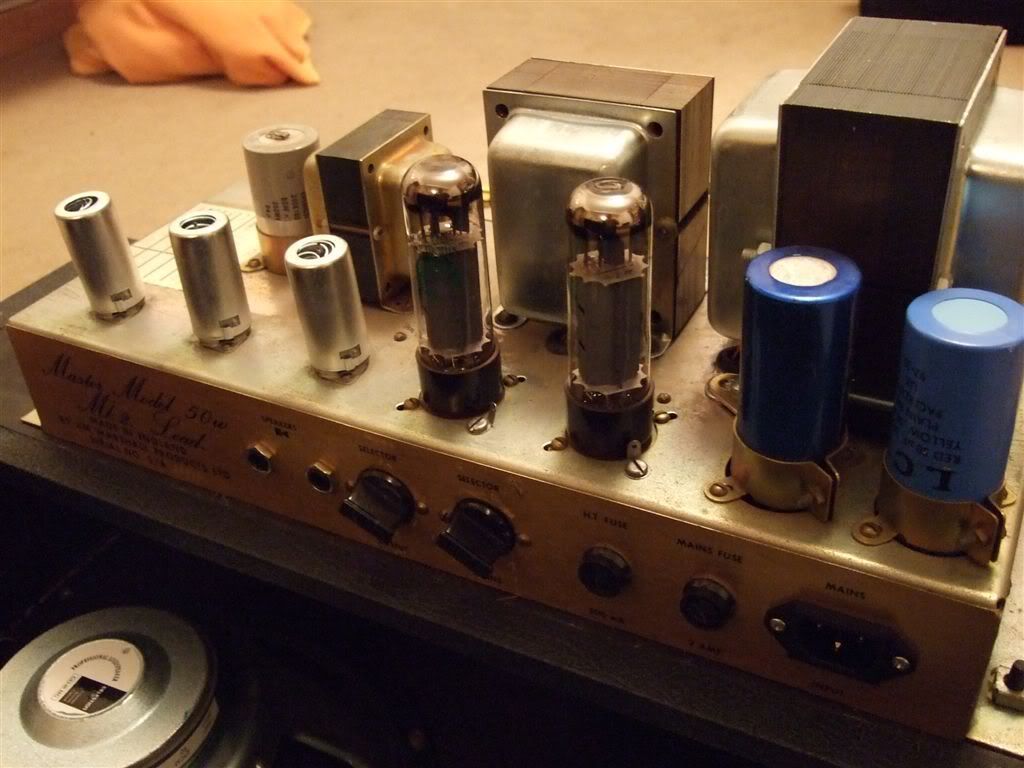
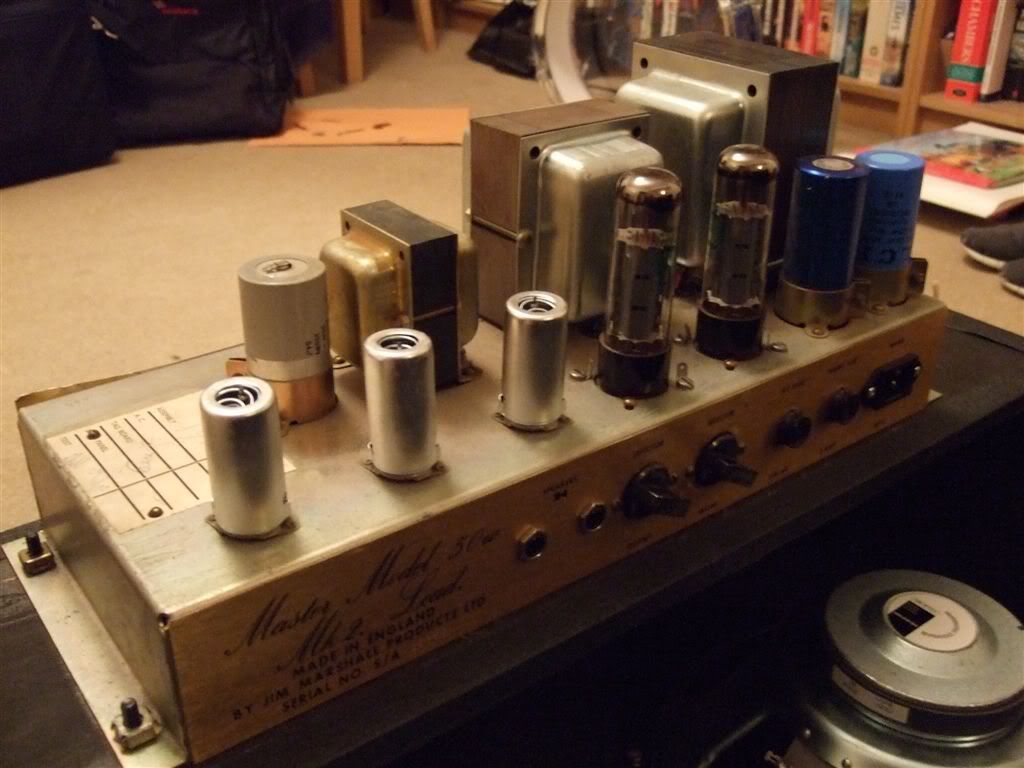

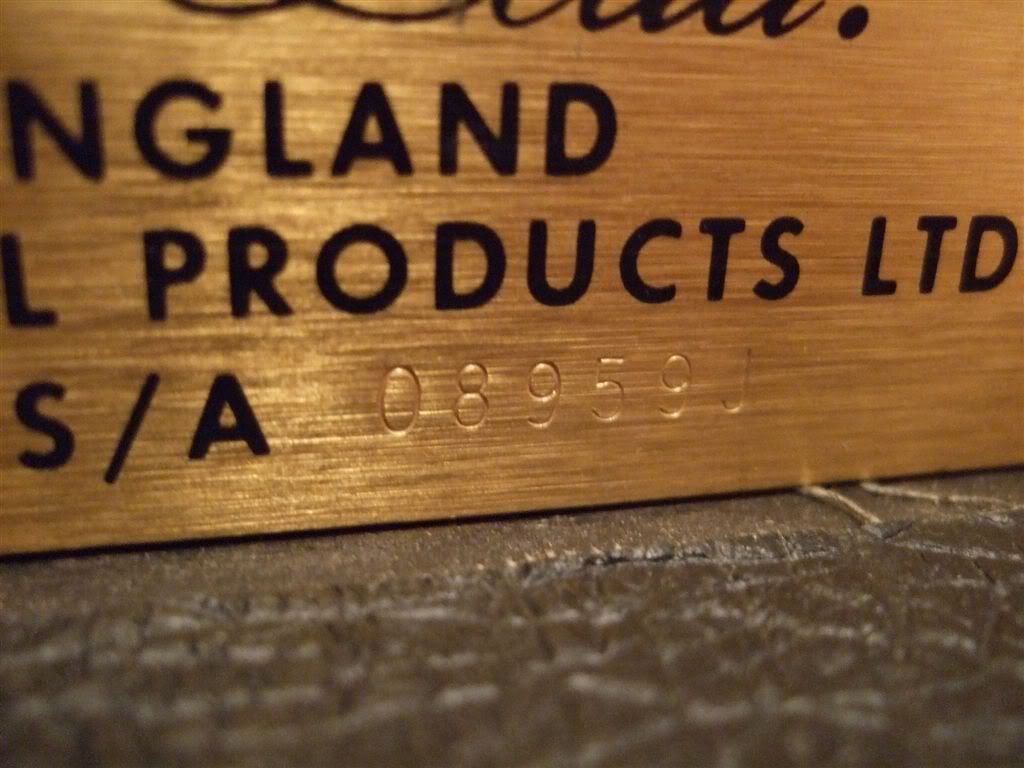
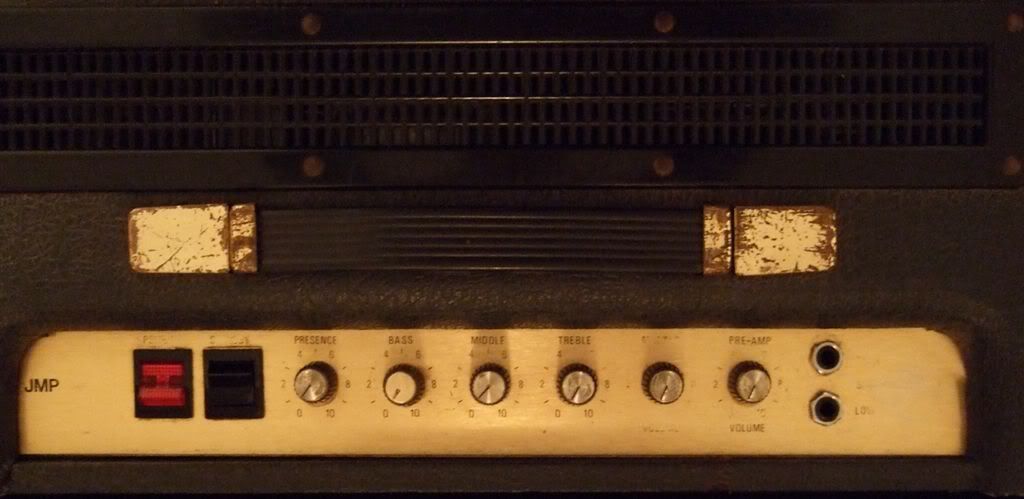
-
The (shortlived) Zoom analogue pedals are absolute diamonds. I have the set.
the Hyperlead is a genius guitar pedal - not tried it on bass. Very good sweepable mid EQ as well as lo and hi.
The Ultra Fuzz is just bloody amazing. Wooly Mammoth my arse. The dual fuzz circuits in the UF are great - you kind of blend between them with one of the knobs from kind of a Big Muff <--> Fuzz Face type sound
Power Driver is nice - very flexible EQ section.
And the Tri-Metal is instant brewtal metalzzorz <ahem> if you like that sort of thing. Again - not tried it on bass though.
Starting to get harder to find (all of them) now too. I almost flogged mine a while back - glad I didn't. -
[quote name='cheddatom' post='284362' date='Sep 15 2008, 04:53 PM']Or am I talking balls?[/quote]

A buffered signal is inherrently far more resistant to the adverse affect of long cable runs or the sh*tty cable that people often use in patch leads (mostly a prob when you have lots of TB pedals) or the top-end loss you get with a pedal with really bad buffer circuit (or odd input or output impedance). A buffered signal will be less (if at all) affected by these things - so better to buffer up front (or us ea unity gain buffer/line driver or active pickups if that's your bag) than to be affected then buffer the adversely affected signal back up to the correct overall level (but with top end missing, for example) -
[quote name='Higgie' post='227852' date='Jun 27 2008, 10:03 AM']Put the tuner at the end of your chain. If you're running a load of true bypass pedals, the buffer at the end will send a nice signal to the amp.[/quote]
Apologies for thread resurrection but : I don't agree with that.
If you have pedals that do adversely affect your tone, you'd have been far better off feeding them a buffered signal so that they don't (otherwise you just buffer the mangled tone).
Active pickups obviously makes all this moot.
I've spent (ok, wasted!) a fair bit of time on this in the past re guitar fx and concluded that:
a. Buffer first is the best bet
b. Even without it 'tone suck' is actually hard to hear with normal, modern, decently designed pedals (yes I sat there switching various combinations of pedals in and out of a TB loop to check this saddo )
saddo ) -
Thanks mcgraham I'll look those youtubers up. Also : "hanon" ?
Ditto to jonnylager
I did find the Dave Marks "bad habits" vids on Youtube - the "don't point your fingers" one has already been useful.
Bizarrely I met Dave Marks earlier this year - if I'd known I was going to be playing Bass I'd have asked him for some pointers ! -
[quote name='charic' post='283848' date='Sep 14 2008, 07:25 PM']Simply follow the following thread

[url="http://basschat.co.uk/index.php?showtopic=27470"]http://basschat.co.uk/index.php?showtopic=27470[/url][/quote]
yeah I've seen that - very good
I'm not some idot looking for a 'play like a genius in 5 mins a day with our special routine' - I'm genuinely interested in something that actually talks about technique in more depth than "alternate your fingers, here are some scales"
If anyone has anything to suggest that's great. If the answer is 'shut up and play', that's also great.
Cheers,
Tim


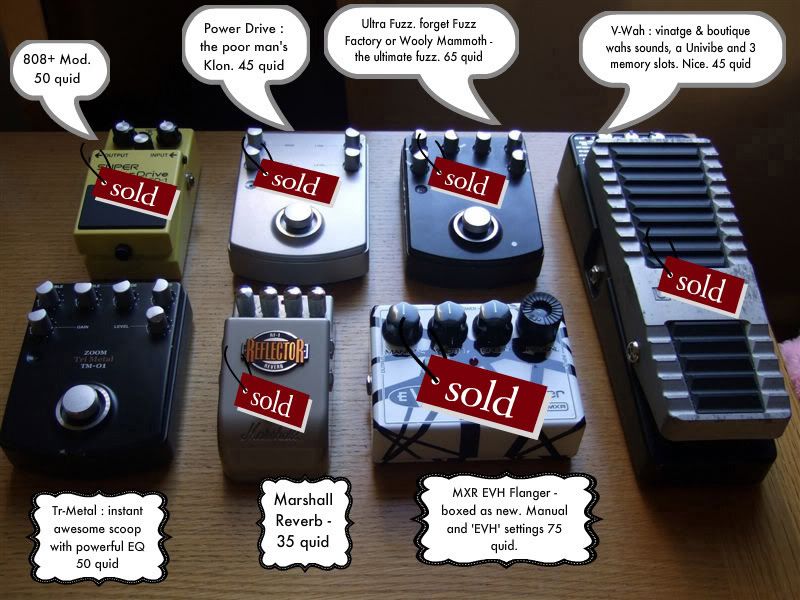
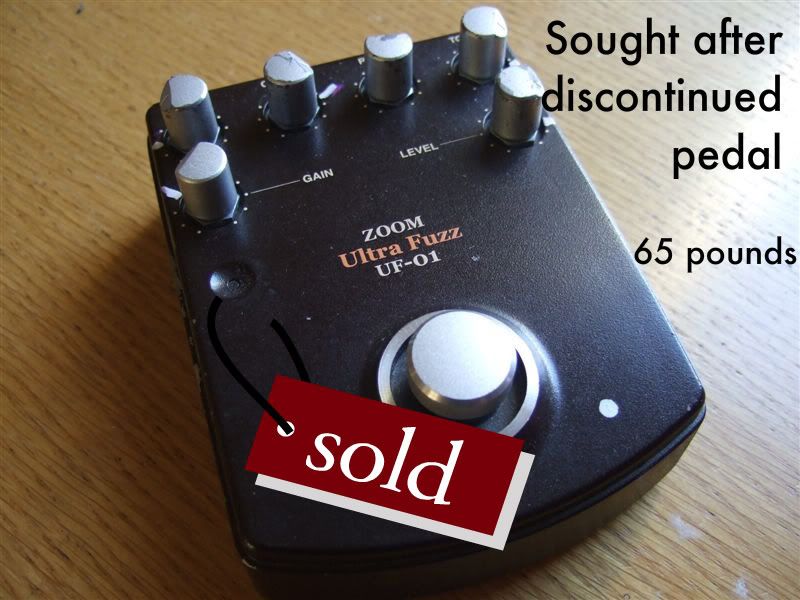


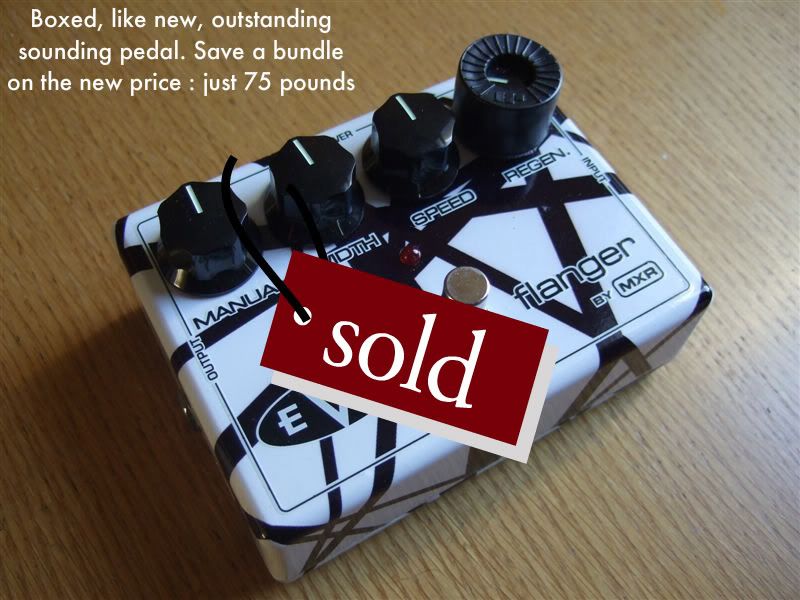
Guitar Pedals
in Accessories & Other Musically Related Items For Sale
Posted
Ultra Fuzz sold pending payment.
Bump for the rest